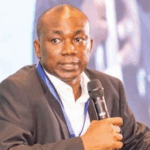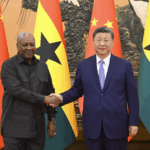
Dr Mahamudu Bawumia’s recent outline of strategies to combat illegal small‑scale mining, popularly known as galamsey, has reignited national debate about how Ghana should confront this deep and complex environmental problem.
His proposals, anchored in institutional reforms, technological monitoring, geographical mapping of mining areas, licensing decentralisation, and the creation of a Minerals Development Bank, are well‑intentioned.
However, they fall short of addressing the true roots of the crisis. Galamsey is not merely an environmental or regulatory problem; it is, as I have long argued, a social and moral crisis that demands a return to traditional legitimacy, communal ethics, and the moral authority of chiefs.
In my article “Galamsey Is a Social Crisis: Only Chiefs, Not Drones or Bullets, Can Heal Ghana’s Wounded Land,” published on MyJoyOnline, I emphasised that galamsey represents a wound in the Ghanaian social fabric, one that drones, bullets, or high‑sounding bureaucratic reforms cannot heal.
It is the product of structural poverty, social dislocation, and the collapse of traditional systems of environmental guardianship.
Therefore, any reform that ignores these human dimensions is doomed to repeat the cycle of failure that has characterised successive government interventions. Bawumia’s approach, though technologically progressive, misdiagnoses the illness and risks reinforcing the same institutional detachment that created the problem in the first place.
At the heart of my position is the conviction that traditional authority remains Ghana’s most credible moral infrastructure. Chiefs and elders, by virtue of their ancestral mandate and proximity to the people, command the moral trust needed to mediate disputes, enforce environmental norms, and foster community compliance.
The postcolonial state has systematically sidelined these custodians through centralised bureaucracy and rigid statutory control, leaving behind a vacuum of moral legitimacy. When the state deploys soldiers and drones, it speaks the language of coercion, but when chiefs summon their people, they talk in the language of belonging.
This difference explains why state enforcement often triggers evasion, while enforcement rooted in custom and collective shame commands obedience.
However, the reality of Ghana’s chieftaincy system today complicates this argument. The chiefs are fully aware of what is happening, and in truth, they may be just as concerned as any other Ghanaian.
Yet their decisions are not binding. In acephalous societies such as Wusuta, for instance, if I were mining gold illegally on my ancestral lands at Todome, what authority would any chief have to summon me to his palace? Even the paramount chief of Anfoega would have no legal power to compel my appearance.
I could refuse to show up, and there would be absolutely nothing they could do. If, in addition, I had the backing of a robust political network or wealthy and influential allies, the situation would only worsen.
Chiefs are regarded as custodians of the land, yet they possess neither subpoena power nor the power of mandamus. In centralised traditional systems such as the Asante Kingdom, chiefs still command significant residual authority, and those chiefdoms tend to be wealthier precisely because power is centralised.
This centralisation allows taboos and other Afrocentric instruments of land control to be more easily enforced. Yet, even in such systems, their decisions carry no binding legal weight under modern states.
Today’s chiefs are largely ceremonial figures, paper tigers whose traditional powers have been usurped by state machinery. It is therefore not enough to call on chiefs to lead environmental governance without providing them with the necessary legal authority and institutional capacity to act.
This is precisely where Bawumia’s proposals fail. His plan to decentralise the Minerals Commission and create District Mining Committees superficially resembles a form of localisation, but it is a bureaucratic, not cultural, decentralisation.
The proposed committees will still operate as appendages of the central state, lacking the spiritual and communal authority that traditional institutions wield. Moreover, the idea of temporary mining licences at the district level contradicts the existing legal structure of the Minerals and Mining Act, 2006 (Act 703) and its accompanying Legislative Instruments (L.I. 2173 to 2182).
These laws prescribe clear procedures for granting mineral rights, including publication, environmental permitting, and cadastral verification. The concept of a temporary district licence lacks legal basis and could easily lead to confusion, corruption, and litigation.
Equally, a key element of Bawumia’s plan is the geographical mapping and digitisation of mining areas. On the surface, this appears to be a progressive and modern solution.
Mapping mining concessions and delineating legal versus illegal zones can indeed improve transparency and help planners understand the scope of the problem. However, the mapping approach assumes that merely identifying and labelling space will induce compliance.
This is a dangerous illusion. The problem is not that Ghanaians are unaware of where mining is occurring; it is that people are mining in areas where they are not supposed to, and they do so due to survival needs, elite complicity, and political interference.
Digitising coordinates cannot overcome moral disobedience or economic desperation. Furthermore, mapping that ignores customary boundaries risks erasing stool lands and ancestral territories, replacing centuries of communal stewardship with technocratic control.
Similarly, the Community Mining Initiative inaugurated by the President in Obuasi and the Responsible Cooperative Mining and Skills Development Programme (rCOMSDEP) are no different.
These schemes are presented as community-led, but in reality, they are government-driven attempts to formalise galamsey through the use of cooperatives, digital licensing, and training.
They mirror Bawumia’s plan almost word for word: formalisation through cooperatives, digitised licensing support, skills training, reclamation, and central oversight. However, beneath this façade lies the same flaw; they are not Afrocentric enough.
They replicate colonial logics of control and impose Western bureaucratic models on African social systems that are historically communal, moral, and kinship-based.
Moreover, the idea of formalising artisanal miners through cooperatives sounds attractive, but in practice, cooperatives in Ghana are often captured by the very elites who benefit from the system’s inequalities.
Mining, even so‑called small‑scale or surface mining, is a capital-intensive venture requiring excavators, wash plants, mercury processing machines, fuel, and transportation logistics. The poor miner or village youth cannot afford these tools.
The allure of investment and the dependence on machinery and financing from rich and powerful patrons force these cooperatives into master‑servant relationships.
The systemic issue remains that those whose livelihoods depend on the enterprise, the diggers, the women who wash the ore, and the youth who risk their lives in the pits, are not the real beneficiaries. The real winners are the wealthy financiers and political backers who own the equipment, buy the gold, and control the permits.
Cooperative licences, in reality, will be bought up or fronted by the exact rich and influential figures in society, just as the political elite has long monopolised pharmaceutical licences and import permits.
Indeed, Ghana’s recent political history serves as a cautionary warning. When the NDC was in power, almost all the vendors and patrons of the School Feeding Programme were party members or sympathisers.
When the NPP came to power, every one of them was removed and replaced with NPP executives and allies. A similar trend is observed in the media and petroleum sectors. How many NDC functionaries own radio or television stations, fuel depots, or bank licences under an NPP government? The answer is none.
And when the political tables turn, the same purge occurs in reverse. The so‑called community mining cooperatives are likely to follow the same pattern. They will operate on the fault lines of partisanship because they are political designs, not community enterprises.
They will become another patronage system, a new avenue for distributing economic spoils to the politically connected rather than empowering the rural poor.
Furthermore, the digitised licensing process is equally problematic. Technology cannot fix an unjust system. Mobile licensing teams may simplify paperwork, but they do not solve the deeper issues of land ownership, allodial rights, or local legitimacy.
Chiefs and families still hold customary authority over land, and without embedding their consent and oversight in these licensing processes, the state’s digital solutions will continue to operate in a vacuum.
In addition, skills development and reclamation training, though commendable, treat symptoms rather than causes. They may produce short‑term employment, but they do not cure the structural poverty that drives galamsey.
The young men and women who risk their lives in the pits do so not because they lack skills, but because the existing economic system offers them no viable alternative.
Until community mining integrates livelihood diversification, such as farming, eco‑enterprises, and local manufacturing, these programmes will merely address the symptoms rather than dismantle the problem.
This is why the galamsey crisis cannot be solved through technocracy alone. In sustainable development, three interrelated dimensions must be treated equally: social, economic, and environmental. The social dimension deals with human relationships and the ways people interact within their communities.
The environmental dimension concerns the health of the natural ecosystem, while the economic dimension addresses livelihoods and survival.
It is impossible to claim that one is solving an environmental problem that affects people’s daily lives without considering their financial circumstances and how these interact with their social realities.
Galamsey, therefore, is not only an environmental issue; it is also deeply social and economic. When I listen to these so‑called technocrats and their narrow, technical interpretations of the problem, I can only shake my head.
Policy formulation should be led by people who understand issues from a multidisciplinary perspective. The role of scientists and engineers should be to provide data and technical insight, nothing more. You cannot solve the galamsey crisis with mining engineers, climatologists, or others from purely scientific backgrounds who have little, or no appreciation of the complex human and economic realities involved.
Mining engineers see soil and ore; climatologists see rainfall and temperature change, but policymakers, development experts, and sociologists see human beings struggling to survive.
It takes an interdisciplinary mind to understand that a miner’s decision to dig is often a desperate act of survival, not greed. Engineers may calculate ore yield, but they cannot calculate hunger. Scientists may measure deforestation, but they cannot measure despair.
The galamsey problem is not a mechanical failure of environmental management but a human crisis rooted in structural inequality, exclusion, and broken trust. Only those who combine knowledge of law, economics, culture, and community life can design policies that address the full spectrum of this challenge.
The findings of my doctoral research at Dunkwa‑Offin clearly demonstrate that any attempt to address illegal mining in Ghana will fail unless policies are grounded in Afrocentric principles of governance, ancestral custodianship, and the lived realities of communities. Galamsey persists not because people reject order but because the present system excludes them, disregards their cultural values, and leaves them with no viable alternatives.
During my fieldwork, I met women who fetch water from the river daily and earn no more than 150 cedis a day from selling it to miners. To them, galamsey is not a crime; it is a localized economy that sustains families abandoned by government policies.
They informed me that no development programmes reach their communities, no water infrastructure exists, and no alternative livelihoods are available. For these women, and for the food vendors who sell rice and beans to the miners, galamsey is a matter of survival. These are not sycophants or greedy opportunists.
They are mothers, widows, and hustlers trying to feed their children in a system that has forgotten them. Their stories are not rooted in avarice but in endurance. When they defend galamsey, they do so not as lawbreakers but as citizens seeking visibility and dignity in a society that has excluded them from economic participation.
A first and necessary step is therefore the recognition and gazetting of chiefs as rightful custodians of the land through the Ministry of Chieftaincy and Culture. Chiefs who are properly gazetted should not remain symbolic figures; they must be formally empowered as partners in governance.
With such recognition, chiefs can be vested with quasi‑judicial powers comparable to subpoena and mandamus authority, enabling them to summon offenders, enforce taboos, and demand restitution when land and rivers are desecrated.
These are not foreign constructs. In Botswana, the kgotla system grants traditional leaders authority to call community members to account, while in South Africa, the Traditional Courts Act recognises chiefs as arbiters in customary disputes.
Empowering Ghanaian chiefs in this way would not create new traditions; it would revive older systems of accountability that colonial law weakened but never eradicated.
To make this authority meaningful and resistant to corruption, gazetted chiefs should also receive cost‑of‑living allowances adjusted to the local conditions of their respective areas.
Many chiefs face constant financial pressures, which expose them to manipulation by politicians and mining interests. Providing official support would preserve their dignity, protect their social status, and reduce the temptation of illicit deals.
It would also signal that the state takes seriously the role of chieftaincy as a co‑equal institution in resource governance.
Furthermore, the current Council of State, established by Article 89 of the 1992 Constitution, should be transformed into a second chamber of Parliament composed of chiefs and traditional leaders.
Through a proportional representation system based on cultural and traditional districts, chiefs could be elected to this chamber, vested with legislative authority, and empowered to review, amend, or block bills passed by the lower house.
Such a system would balance political dominance, bring the moral authority of chieftaincy into lawmaking, and ensure that decisions regarding land, minerals, and the extractive sector reflect both ancestral custodianship and modern governance.
For centuries before colonialism, chiefs presided over councils, passed rules, and enforced taboos in ways that combined spiritual and political legitimacy. Transforming the Council of State into an upper house of chiefs would be a continuation of this heritage, not a departure from it. It would also address the crisis of legitimacy in acephalous societies where the authority of chiefs has waned.
By placing them within a national legislative framework, traditional leaders across Ghana could regain trust and legitimacy, offering a more consistent form of custodianship across regions. Integrating chiefs into governance in this way would also strengthen Ghana’s commitments to climate action and the Sustainable Development Goals. By affirming ancestral taboos that protect forests and rivers, such reforms would help preserve carbon sinks, advance REDD+ initiatives, and promote SDG 13 on Climate Action and SDG 15 on Life on Land.
Empowering chiefs with real authority would also enhance SDG 16 on Peace, Justice, and Strong Institutions by rebuilding public trust in governance through culturally legitimate systems. In this way, Afrocentric reforms would not only address galamsey but also contribute to global climate justice and sustainable development.
Ultimately, galamsey thrives not only because of weak enforcement but because of a deeper moral erosion, a loss of reverence for the land, rivers, and forests that once formed the spiritual heart of Ghanaian identity.
Healing this moral wound requires both cultural revival and institutional redesign. Chiefs must be empowered, communities must reclaim their role, and the government must learn to partner with the people it claims to serve.
Only when environmental governance flows from the soil upward, rather than from capital downward, can Ghana truly heal its wounded land.
About the Author:
Dr. Manaseh Mawufemor Mintah is an Environmental Health Compliance Manager at the U.S. Environmental Protection
Agency (EPA) and a scholar of mining law, environmental governance, and sustainable development. He holds a PhD in
Environmental Studies from Antioch University New England, a Juris Doctor in Environmental Law from the
Massachusetts School of Law, and a Master’s degree in Sustainable International Development from Brandeis
University. He is currently pursuing an LLM in International Minerals and Energy Law and Policy at the University of
Dundee. His doctoral research, “Repositioning Traditional Authority in the Fight Against Illegal Gold Mining in DunkwaOffin,” explores Afrocentric governance models for addressing Ghana’s galamsey crisis.
- President Commissions 36.5 Million Dollars Hospital In The Tain District
- You Will Not Go Free For Killing An Hard Working MP – Akufo-Addo To MP’s Killer
- I Will Lead You To Victory – Ato Forson Assures NDC Supporters
Visit Our Social Media for More




